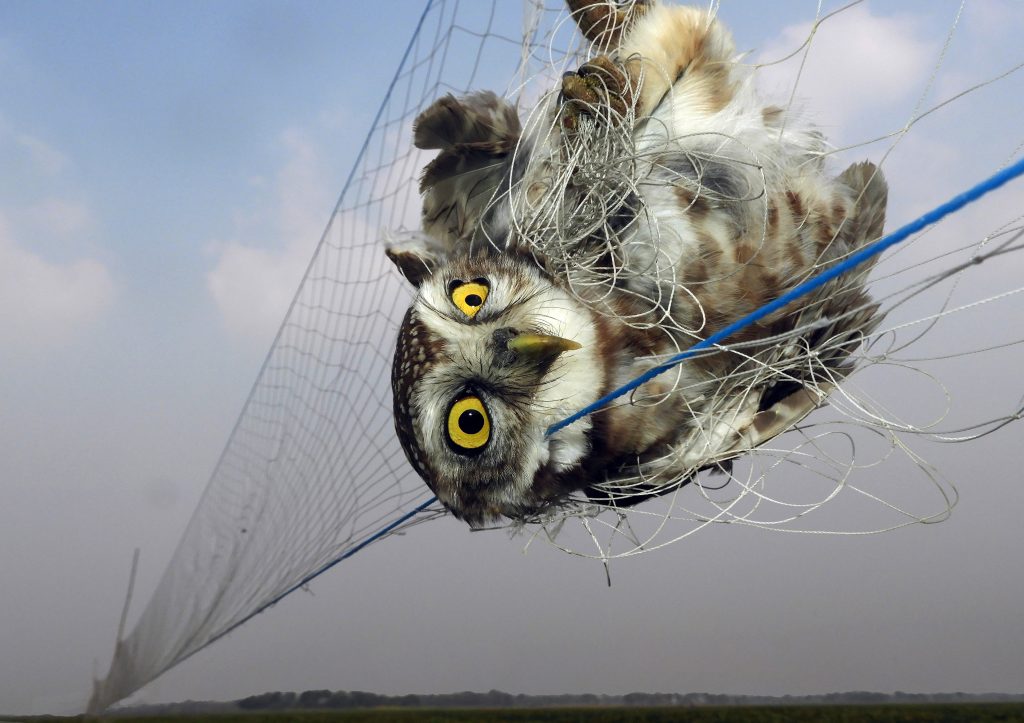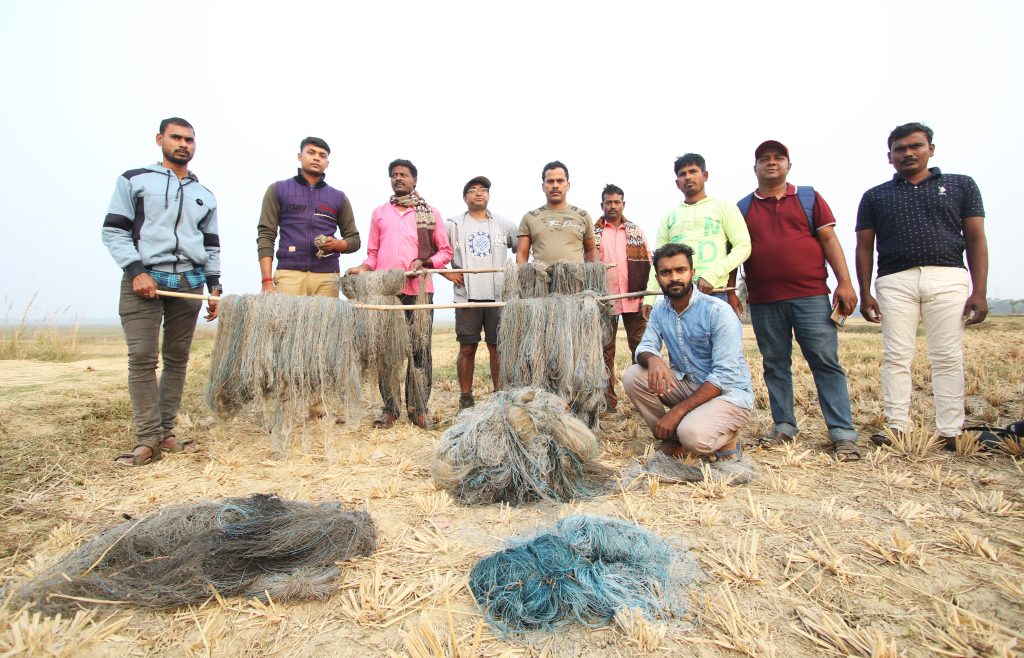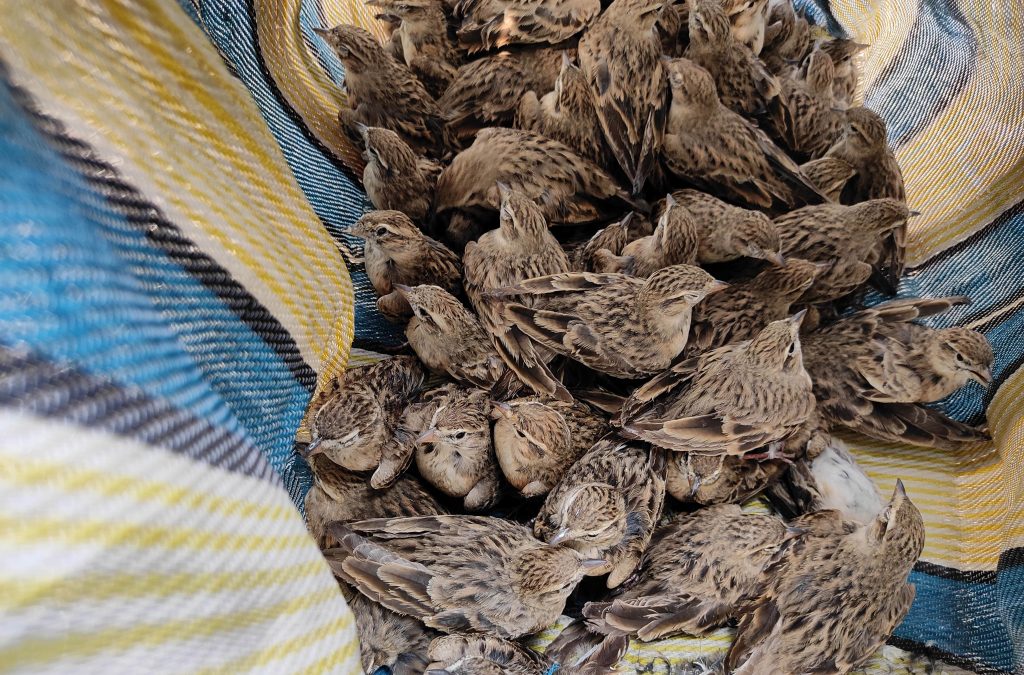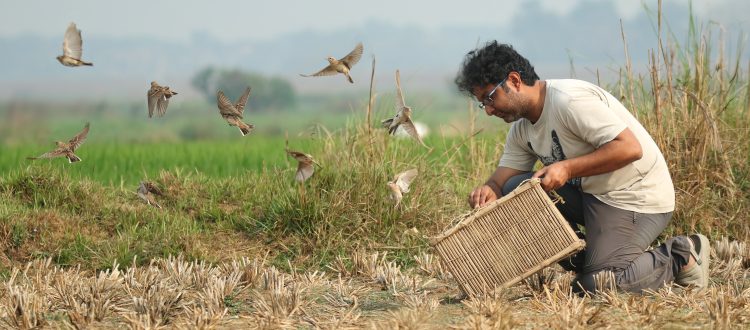Taken from the Sky – Saving the Larks of Murshidabad
Murshidabad, 24th April, 2023: Every year, tens of thousands of waders and migratory passerines fly through West Bengal. However, this has also given an opportunity to poachers to hunt and sell wild-caught birds. Murshidabad in Central West Bengal, especially, has become the commercial hub of this extensive illegal trading. While the exact number of birds poached every year remains unknown due to the surreptitious mode of their capture and sale, the estimate numbers go over tens of thousands. Suvrajyoti Chatterjee has been working with Wildlife Trust of India to put an end to this trade and ensure that these winter visitors have a safe passage.

Spotted owlet trapped in a net put up for short-toed larks in Murshidabad | Photograph by Santanu Das
Bird traps across Murshidabad
While, the commercial trade in wild caught birds is not just limited to the migratory species, this seasonal hunting mostly accommodates non-resident waders, waterfowls, and passerines, and include Trans-Himalayan migrants like Greater short-toed Larks (Calandrella brachydactyla), Garganey (Spatula querquedula), and Eurasian Coot (Fulica atra). The regionally rare Red-throated Pipit is also known to fall prey to this illegal trade. Traps, in the form of mist nets and fish nests are regularly laid along the agriculture fields to capture the birds and cater to the increasing demands in the local market.
Suvrajyoti, with support from the Wildlife Trust of India, undertook a Rapid Action Project (RAP) to address this situation. They started by forming a team to help gather information on the hunting activities while simultaneously working towards removing the nets.
“More than 40 km of nets have been removed as of now and over 900 birds have been rescued and released. The species we have been able to help include Greater short-toed larks (Calandrella brachydactyla), oriental skylarks (Alauda gulgula), Bengal bush larks (Mirafra assamica), Lesser Whistling-Duck (Dendrocygna javanica), Pheasant-tailed Jacana (Hydrophasianus chirurgus) and Green Bee-eater (Merops cyanophrys)”, says Suvrajyoti.

Suvrajyoti and his team with the removed nets | Photograph by Santanu Das
Apart from removing nets, rescue operations in collaboration with the local forest department officials have led to the arrest of 5 local poachers and illegal traders. Information was gathered for these rescue operations through market surveys and site inspections, also leading to the development of a strong regional network of local volunteers and supporters. In one instance, the team found a total of 24 larks inside a chicken pen. The team successfully assisted the Forest Department with the arrest of the responsible poachers and release of the birds.
“Our team has been monitoring the poaching activities relating to Greater short-toed larks for the last two months and the results have been alarming. These seizures only go on to show the scale of poaching and more importantly, the demand for illegal bush-meat in the local market” adds Suvrajyoti.

Rescued Short-toed larks rescued from poacher | Photograph by Santanu Das
Suvrajyoti’s team is working towards involving all essential stakeholders ranging from local administration level and Block Development Officers to school children and locals. Sensitization efforts and awareness drives in association with the Forest Department and local village panchayat representatives also includes the installation of signboards near popular wetlands, common hunting grounds and local markets. A helpline number has been created where locals would be able to report bird poachers to the team and already have several leads.
Thanks to the intensive sensitization activities and thorough monitoring, poaching instances have significantly gone down with few to no hunting attempts recorded from areas where the team has a presence.









